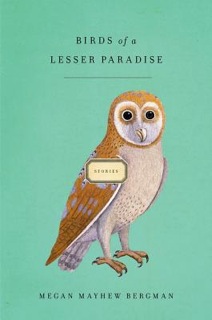Birds of a Lesser Paradise by Megan Mayhew Bergman, Scribner 2012By HEDY ZIMRA
Birds of a Lesser Paradise, Megan Mayhew Bergman’s debut story collection, is a disquieting foray into 21st century realism. There are twelve stories united by their connection to the natural world and mothers. Each one is an examination of contemporary life told with mercy. The close study of motherhood, both animal and human, informs the tone of the stories and those that inhabit them. There are dystopian elements that keep the prose from becoming sentimental, population control activists, artificial organs that keep people alive for too long, bow hunters. Animals such as the whale, chinchilla, raccoon, feature prominently with copious details that offer an empirical texture to the sentences.
In the first story, “Housewifely Arts,” which was published in both One Story and Best American Short Stories 2011, the eponymous bird is a metaphor for distance. A single mother is on a road trip to Myrtle Beach with her small son in search of an African Gray Parrot that she had given to a roadside zoo after her mother’s death. A strong voice is immediately established. “I am my own housewife, my own breadwinner. I make lunches and change lightbulbs. I kiss bruises and kill copperheads from the back creek with a steel hoe.” The narrator wants to retrieve Carnie so that she can hear her mother’s voice once more. A sound that she cannot remember with clarity, but she is hoping that the thirty-six year old parrot is still capable of flawless mimicry.
“In our house, the word breeding was said with the same vitriol used when mentioning Republicans, Tim Tebow, and pit bull fight clubs,” says a young woman who finds herself unexpectedly pregnant in “Yesterday’s Whales”. She and her partner are population control activists for the EWU (Enough With US), frequenting coffee houses to spread their message and recruit new members. The prose is sharp and bittersweet with Mayhew Bergman reminding us of the power that biology wields over our modern lives.
The stories in this collection each have a tenacious voice and gaze out into the world with psychological depth. Regret and acceptance collide on the page. “Remember,” I told my mother, “I’m not obligated to look after the bird.” “Well, she said, “I’m not obligated to look after you.” Mayhew Bergman’s keen observations of the animal kingdom are so convincing that one wonders how she didn’t have a prior career as a zookeeper or scientist. The writing could be the offspring of an Alice Munroe and Amy Hempel marriage. The controlled nature of the prose with descriptive language used when necessary echoes Hemingway’s Men Without Women. Even some of the stories feel inspired. “Yesterday’s Whales” reminded me of “Hills Like White Elephants” with a woman’s body changing and an unplanned pregnancy. Her ability to elevate the mundane into a something profound at the single sentence level makes this collection worth reading. Her characters, both gusty and damaged, exist to listen and propel each other forward through their lives. In a sea of oft too-clever writing and sarcasm, this felt unusually authentic.
Birds of a Lesser Paradise by Megan Mayhew Bergman, Scribner 2012, ISBN: 978-1-4516-4335-0
Hedy Zimra reads poems and fiction for PANKand teaches high school in Providence, RI.
We accept book reviews for our website. Please query via the contact page before submitting. Reviews must be under 1000 words. Our aim is to support new and emerging writers, and other small presses. Poetry and experimental prose reviews preferred. Review submissions accepted all year round.



